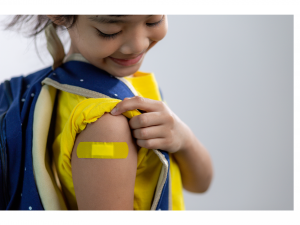May kids get Covid-19 vaccinations without parents permission?
Ontario’s Healthcare Consent Act actually gives youth a taste of autonomy prior to adulthood. A common misconception among the general public is that in order for youth to receive medical treatment, parents and guardians have to provide healthcare consent on behalf of their child. However, Ontarians may be surprised to learn that some youth under the age of 17 do not need parental consent to receive a COVID-19 vaccination.
But, in light of the pandemic response, there is more to be said on this topic.
 With exponential COVID-19 case growth in December 2021, the province announced, on January 3 that schools would go back to in-person education after a week and a half of online learning. With the return to in-person learning, COVID-19 transmission in schools remains a topic of concern for youth now eligible for vaccines. Following the example of the adult vaccination roll out, children ages 5 to 11 were given the green light to receive child-sized COVID-19 vaccines from Pfizer in November of 2021. Youth ages 12 and up received the go-ahead to receive doses last May.
With exponential COVID-19 case growth in December 2021, the province announced, on January 3 that schools would go back to in-person education after a week and a half of online learning. With the return to in-person learning, COVID-19 transmission in schools remains a topic of concern for youth now eligible for vaccines. Following the example of the adult vaccination roll out, children ages 5 to 11 were given the green light to receive child-sized COVID-19 vaccines from Pfizer in November of 2021. Youth ages 12 and up received the go-ahead to receive doses last May.
Eligibility for youth and child vaccinations now clashes with provincial legislation regarding the parameters around vaccine consent. Here is why: under Ontario’s Health Care Consent Act, there is no minimum age of consent for individuals to make decisions pertaining to medical treatment, provided that they meet the requirement of informed consent. Informed consent means the recipient understands the treatment, why it is being recommended, and the risks and benefits if they accept or refuse the medial treatment. If someone is found to be incapable of giving informed consent, a substitute decision-maker may be called upon to provide consent on their behalf. Simply put, without an age benchmark for consent, Ontarians have autonomy over their own health decisions unless circumstances prove otherwise.
Law not so clear cut
But if we consider Ontario’s Health Care Consent Act in the context of youth and child vaccination the law is not clear-cut.
The province has deemed that young people ages 12 and up are officially capable of giving informed consent to receive the COVID-19 vaccination without parental or guardian consent. In the event an individual in that group lacks the capacity needed to provide informed consent, ordinary restrictions apply and a substitute decision maker will be needed. However, push back regarding youth vaccine autonomy by parents and legal guardians in the province has been loud. With peer pressure and rabbit holes of misinformation about vaccination on social media, it isn’t surprising that some parents at least, would be uncomfortable with their children’s latitude of autonomy regarding COVID-19 vaccination.
Moreover, parents across the province are now faced with the paramount question : “Can children get a COVID-19 vaccine in Ontario without their parent’s permission?” This is where Ontario faces a question. The province makes it clear that parents or substitute decision makers of children aged 5 to 11 will, for the most part, have to provide consent at the time of a vaccination appointment, before their children can receive a vaccine. Ontario’s Associate Medical Officer of Health Dr. Vinita Dubey says that ” while in Ontario, there is no age of consent in the Health Care Consent Act … developmentally most children under 12 are not able, or as we say in medicine ‘capable’, to provide their own consent, which is why it falls to the parent or guardian.”
Ontario is pushing to vaccinate children ages 5-11 – the last group to be eligible for a shot – and is focusing its drive on school-based vaccine clinics partnered with local Public Health Units. Accordingly, consent forms for in-school vaccination clinics will need to be signed by a child’s parent or guardian and sent back to the school in order for them to receive the vaccine. Otherwise, if a child shows up with their parents to a clinic, there is implied consent.
What if?
As a law student I’m learning to constantly consider “what if?” What if, an 11 year-old, wants to receive the COVID-19 vaccine but their guardian(s) refuse to provide consent? I remind myself that any good law student learns that almost all rules have exceptions.
In the event a child wants a vaccine without parental or guardian consent, experts admit this would be a very challenging situation. Dr. Adam Kassam, suggests that this decision could be determined by a family doctor – Dr. Dubey says that the child’s family physician would be the best resource in this matter since a physician would do a heightened assessment to determine if the child has a complete understanding of what they are agreeing
 to. In this scenario, Dr. Dubey admits the assessment process of a child would likely be “a bit more intense” than what would be required of an adult.
to. In this scenario, Dr. Dubey admits the assessment process of a child would likely be “a bit more intense” than what would be required of an adult.
Due to the possibility that the hypothetical situation I mentioned could occur, some public health clinics in Ontario require parental consent for the 5-11 age group because nurses and immunization administrators are not equipped with the expertise to carry out a heightened assessment on children.
For many, this requirement at public health clinics could bring a sigh of relief. Given the subjectivity around making the “right” decision, it is no surprise that parents and guardians would feel as though such a complex decision should require their consent. On the other hand, restricting the possibility for children to provide informed consent without parental approval at public health clinics directly challenges the autonomous nature the Ontario Healthcare Consent Act has to offer.
Until youth and children became eligible for COVID-19 vaccinations, the importance of Ontario’s Health Care Consent Act was quite often overlooked. Today, the Act has become highly relevant to the everyday lives of Ontarians as it provides youth and possibly younger children the autonomy to make their own decisions in the midst of what feels like a never-ending pandemic. It’s just that, due to circumstances above, it might provide this autonomy unevenly.
Regardless of the way it is received, the legislation providing individuals with autonomy over their own medical-decisions, protects the human rights of the young and the elderly to maintain control over their bodies. It seems as though Ontarians, like law students, must get comfortable with the type of ambiguity the law has to offer.
Victoria Lunetta, is a law student at Osgoode Hall, York University and writes on the behalf of the Osgoode Hall Family Law Association
Sources:
Ontario’s Health Care Consent Act
Covid Vaccines for Children and Youth
Can a child get a COVID-19 vaccine in Ontario without their parent’s permission? – CTV News

